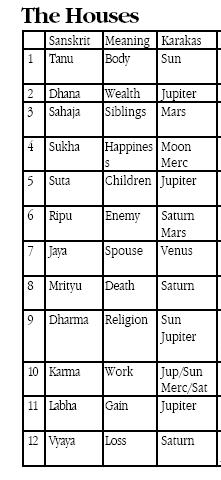
Karako Bhavo Nashto
-
karaka = actor, agent
-
bhava = born-place
-
nash = destroy
= the significator [karaka]destroys [nash] the house [bhava]
Too Much of a Good Thing
overwhelming personalities

" Table of Houses " from Das Goravani, JS.3
If the karakatva-graha
of a major life experienceshould occupy the karakatva-bhava which also signifies that major life experience,
-
then the matters of that bhava are damaged by overdevelopment.
Typically, the normal patterns of the occupied house are quite overwhelmed by intense, dominating personality of the spouse, relative, or other agent whom is signified by the karaka graha.
By means of the excessive demands of the spouse, family-relative, or other agent of the bhava, one experiences an overwhelm caused by too much spouse, too much guru, too much professor, too much father, et-cetera.
[Chandra in bhava-4] = [dikbala] does not cause an overwhelm but rather quite the opposite, suggesting a devoted parent especially a home-loving mother.
Most issues of karako bhavo nashto afflict the patriarchal roles of pitristhāna-9.
Despite potentially benevolent external appearances, matters of the bhava may become internally overblown or overextended. The relationship may become difficult to enjoy, often due to the overconfidence or over-assertiveness of the karakatva.
-
Caveat: one single factor like karako bhavo nashto does not a reading make.
-
Parashari drishti upon the bhava, and navamsha position of the karaka, are critically important also.
-
Favorable drishti can alleviate most symptoms of karako bhavo nashto.
QUOTATION
Robert Svoboda and Hart deFouw, Light on Relationships, p. 251
" While destruction (nashto) suggests that the beings indicated are somehow rendered null and void, in practice, such placements suggest that the significations are in some way blemished.
-
Jupiter occupying the fifth bhava, for example, "blemishes " one's children (the individual may not have any, or may be troubled through or by them).
-
The Sun in ninth "blemishes" father,
-
Mars in third, younger siblings,
-
Jupiter in 11th, elder siblings.
-
...Venus... damages marriage, regardless of what it may imply about the partner's position, wealth, or attributes. Even when the spouse remains "unblemished" (remains strong, healthy, athletic, rich) the marriage may not work (it may "die" ). ...
... Karako bhavo nashto can be applied to the navamsha lagna as well. Venus in the navamsha lagna often creates a kind of equivalent to Venus in the birth chart's seventh bhava, with the important exception that a Venus [which] occupies its own rashi is in a good position for marriage." [END QUOTE]
- Surya in bhava-9 in Mesha or Simha
- Guru in bhava-9 in Karkata, dhanus, or Meena
(although not technically a cause of karako bhavo nashto, Mangala in bhava-9 in any rashi can be an indicator of destructive aggression or physical misfortune for the father.)
svakshetra-Surya or [uchcha] surya in 9 = karako bhavo nashto = arrogant, Authoritarian, autocratic, solipsistic, or self-important father.
Depending on Surya's character by rashi nakshatra and responding to drishti, the father may be perceived as a narcissistic personality. Under pressure, such a father can be controlling, shaming, scolding, or self-righteously indignant.
sanctimonious father
= [nīcha] Ravi-Tula in bhava-9 = a different variety of blemish. Father distrusts himself . Often associated with a father figure who compensates with sensual enjoyment to assuage his self-contempt.
In both cases there is too much father.
In svakshetra, there is public dignity despite his arrogance. In nichha, there is embarrassment over the father or disgrace.
[uchcha]
surya in 9 might make the father a tremendous military general or some kind of hero,
but their role in the child's life is excessively egoic-mind focused.
Surya-Karkata for the Vṛścika indriya-lagna is strong-willed and settled into the land. Although a protective patriarch, such a father may indicate that there is not room enough for both of us
- Surya in bhava-9 in Mesha or Simha
- Guru in bhava-9 in Karkata, dhanus, or Meena
Guru-9 may be excessively identified with ritual training and the power that this training supposedly confers.
Over-valuation or idolatry of spiritual guru and sacred lineage .
Can be church-proud and patronizing toward those who hold other beliefs.
Also Guru = karaka for expansion. In bhava-9, astrong Guru can indicate boasting or overconfidence. Such a person may believe that they possess knowledge or abilities which they don't in fact have or can't legitimate.
= [nīcha] Guru = false, materialistic, or over-inflated doctrine
- Shukra in bhava-7 in Urisha, tula, or Meena
[Shukra-Urisha] = [Malavya Yoga] sensual, pleasuring relationships
-
USA Black Power 1925-1965 Nation of Islam Malcolm X [Surya-yuti-Shukra]
-
UK-Princess 1961-1997 Diana Spencer
Shukra-Tula - Malavya Yoga expert negotiators
-
POTUS-21 Civil Service 1829-1886 Chester A. Arthur [Shukra-yuti-Budha]
[Shukra-Meena] = [uchcha] [Malavya Yoga] [imaginative dreamlike relationships
-
Friends 1969- drama-fashion Jennifer Aniston + [Shani-yuti-Rahu]
Shukra-7 may become overwhelmed by excessive marital sensuality or the spouse may possess inordinate amounts of attractive energy which generates further relationships.
[uchcha] shukra or svakshetra-Shukra in bhava-7 = a too-strong feminine power of beauty, charismatic diplomacy, or wealth-building negotiation. The agent is more Typically, an overwhelming female mate. However, Shukra indicates relationships. A wealthy, handsome, socially connected, indulged and sensually entitled male spouse may also become problematic in marriage via his other relationships.
Sex-and-party marriages seen here; quickly exhausted by the "sugar-rush" and unhappily striving for more physical pleasure sensations.
Wealth-bargaining Shaukra-7 if excessively empowered must display more luxurious status-objects, experience more sense-pleasure, flaunt more beauty, indulge more appetites.
The wifely-figure or husbandly-figure may seem too beautiful, too sensual, too much concerned with material wealth, or too much gifted in the arts of relationship .
Supposedly [uchcha] shukra or svakshetra-Shukra in bhava-7 produces Malavya Yoga. Yet uncomfortable drishti can exacerbate the sensual-material elements in marriage.
Vrishabha: marriage may suffer from excessive focus on wealth and sensual luxuries.
- Spouse = acquisitive and oriented to visual beauty. Marriage may devolve into sensual overload. Often financial well-being increases within the union. However, the wifely-companion player and the marriage itself, from a social perspective, is not amenable to finer feelings or even a high degree of literacy because of the over-emphasis on music, arts, wealth and sense pleasures.
- Much emphasis on diplomatic and contractual arrangements. Focus upon the peerage * paréage. Concern with interior and exterior design of the home, prestige of clothing and furnishings, and making a balanced presentation in all things. Attempt to maintain a perfect balance.
-
[Guru in bhava-5] in any rashi
Typically = fewer birth children when Guru occupies putra-bhava-5. Potential exceptions created via other graha in 5. For example, if Guru yuti lagnesha in 5 or Guru-yuti-Chandra in 5 = at least one child. But Guru-yuti-Surya - unless Surya is also lagnesha = likely no offspring.
Brihaspati has the most effective child-blocker powers when Brihaspati occupies 5th from Chandra .
Often Guru in bhava-5 indicates a wonderfully gifted, childless teacher, but this position is not so ideal for a parent.
[Guru in bhava-5] really only succeeds when Guru can turn off the expansive, inspiring, theatrical performance at the end of the day.
In parenting, Guru/5 tends to pump continuous permissive-expansive energy into the children, and the children don't get the non-activity downtime or even the sleep they need.
By contrast, the fertile drishti of Guru upon bhava-5 is very beneficial for both parent and child.
When [Guru-yuti-Rahu]in putrabhava-5, apattern exists for welcoming children by adoption or via unorthodox means
-
Material Girl 1958- dance song cinema Madonna [Guru-yuti-Rahu]
EXAMPLE
So. African girls-school patron "O" 1954- multimedia Oprah Winfrey = uchcha Shani. Ms. Winfrey was as a child bitterly punished by ignorant [Shani] caretakers in an isolated farm setting.
May overwhelm the natural human capacity to move with nature and accept cycles of dissolution. The Learner may get stuck in bitter regret and have difficulty moving forward(Shani freeze) .
In favorable rashi such as uttama or svakshetra, may suggest long, sustained campaigns of social-justice effort [Shani] in distant lands that in involve many setbacks and resistance from government agents.
Shani can resist the gentle movement of neutral acceptance, replacing it with fearful rigidity and depression.
Post-traumatic shock disorder may be seen from structurally overwhelming loss of identity (12) during Shani bhukti, with radix Shani in 12.
karaka graha = Guru, Surya , Budha, Shani
karako bhavo nashto in bhava-10 = "bossy"
EXAMPLE
Uttama or svakshetra Surya-10
Uttama or svakshetra Budha-10
-
Total Surrender 1910-1997 Mother Teresa of Kolkata + [uchcha-Budha-yuti-Guru]
Uttama or svakshetra Shani-10 especially in Tula, makara, Kumbha
-
anti-Nazi theologian dietrich Bonhoeffer
Uttama or svakshetra Guru in bhava-10
-
NASCAR 1951-2001 motorsports Dale Earnhardt
Surya-10 in any rashi gets dikbala. Although one enjoys holding professional authority, one is also often perceived as an overwhelming egoic-mind membrane force in the executive role.
= high visibility, autocratic, dominating father. A masculine native becomes himself the autocrat, distinguished by 'blindness' to the condition of those below.
- Behari says,"You are able to attain a high social status, but your actions are self-centered and autocratic. Society is unhappy with you and you are not much respected."
svakshetra Budha in bhava-10 = too much information
high visibility siblings or co-workers; too much publication or journalisam
= bhadra yoga = the panch mahapurusha yoga for Budha = intellectual greatness.
Neutral chatty Budha = not harmful to career in quite the same way as the highly self-determined hot-bright svakshetra Surya can be, yet the Learner may be annoying to others and receive less favorable promotions as a result.
svakshetra Shani-in-bhava-10 = too much social-rank-rigidity
Potentially bitter about the diligent effort required to climb the ladder of social success. May resent the perceived social advantages of those from more privileged backgrounds. The Learner may feel isolated by having been born into commoner status.
svakshetra Guru-in-bhava-10 = too much doctrine
Perhaps the least difficult condition of karako-bhavo-nashto dilemma, but nevertheless a "too much" placement. Theoretically, philosophically, dogmatically self-confident Brihaspati residing in karma-bhava tends to prefer a program of expansive and tolerant preaching when conforming, constrictive lawful governance is required.
The Learner may be seen as a well-intentioned and likeable public figure, but not an effective governor. Hard-working karma-sthāna wants pragmatic, sober, orderly, rule-bound adherence to structured principles. Broad-ranging discussions of philosophical possibility are perceived as blustery and off-point in the contexts of 10 which are concerned not with theory but with social reality.



[How Readings Work] = [Sample Sacred Jewels Ratna Recommendation] = [Seva]
 file update =
24-Feb-2026
file update =
24-Feb-2026
[Copyright © 1994-2034 by Barbara Pijan Lama] = [Contact] = [How to Request a Jyotishavidya Reading]
Barbara Pijan Lama Jyotishavidya Vedic Astrology Surya Sun Chandra Moon Mangala Mars Budha Mercury Guru Jupiter Shukra Venus Shani Saturn Rahu Ketu Graha Planets Dasha Timeline Calendar Nakshatra Navamsha Marriage Children Treasury Career Spiritual Wisdom Cycles of re-Death and re-Birth
The information on barbarapijan.com , including all readings and reports, is provided for educational purposes only. Wishing you every happiness and continuing success in studies!
